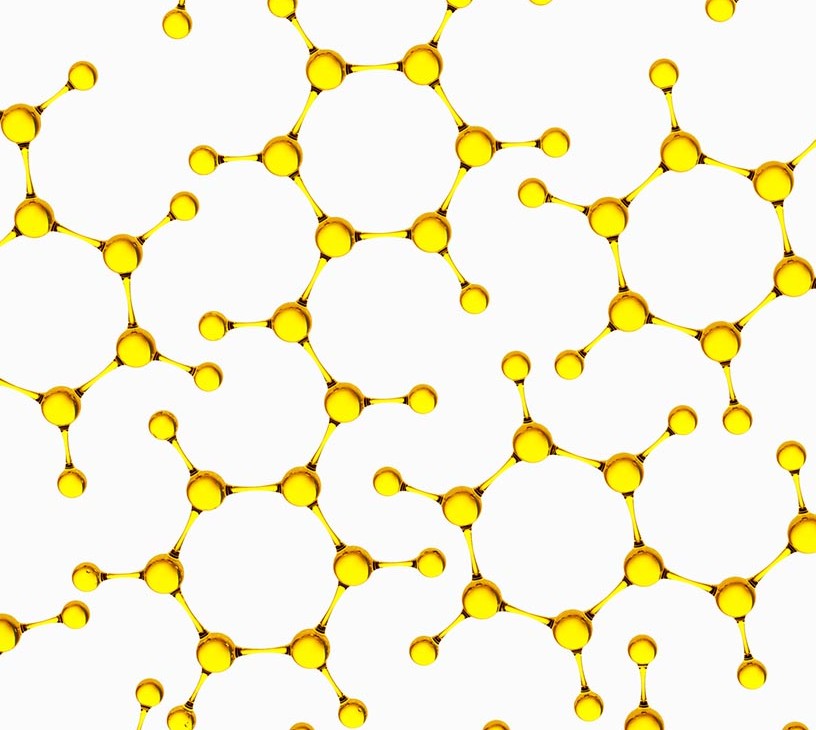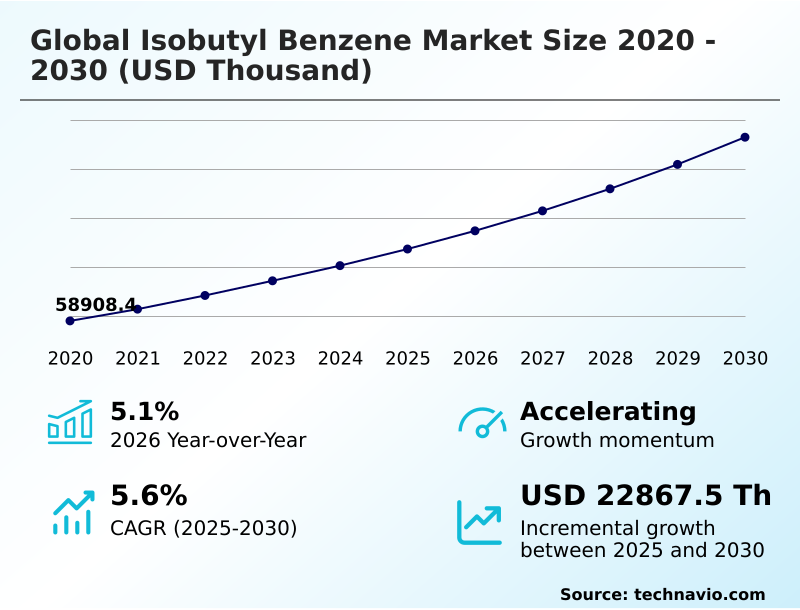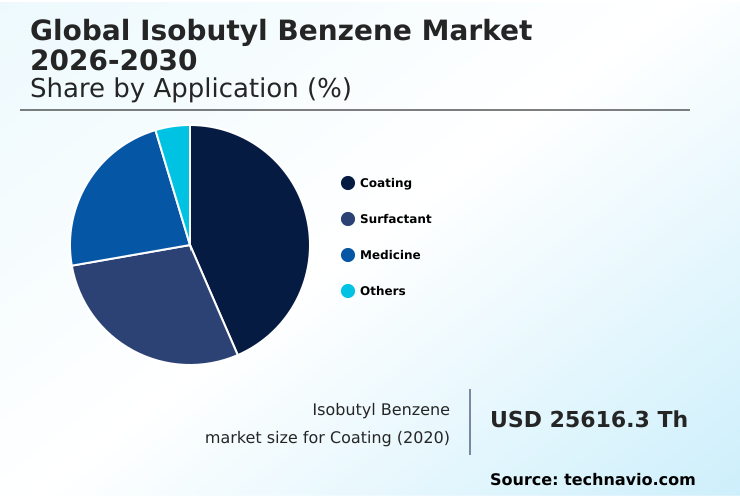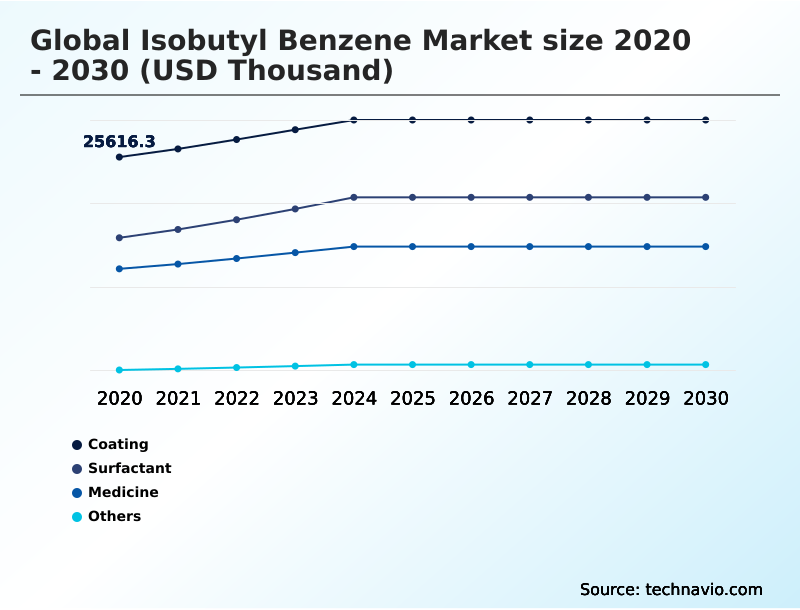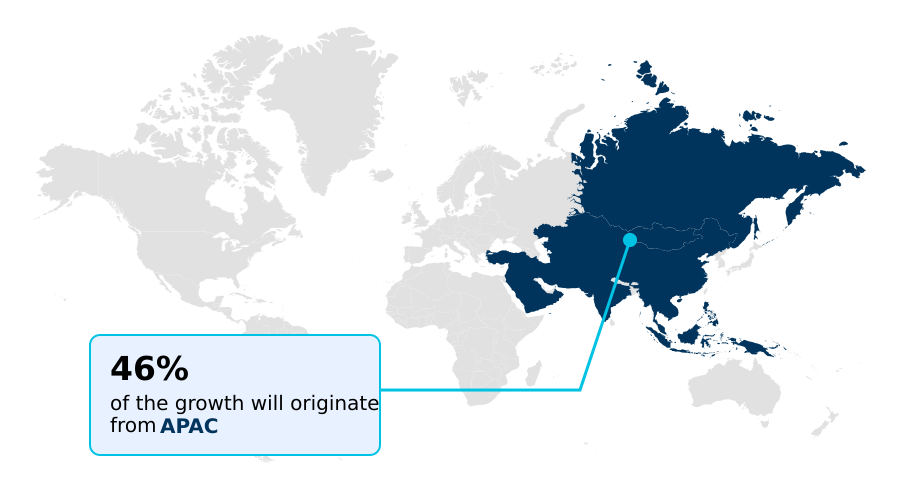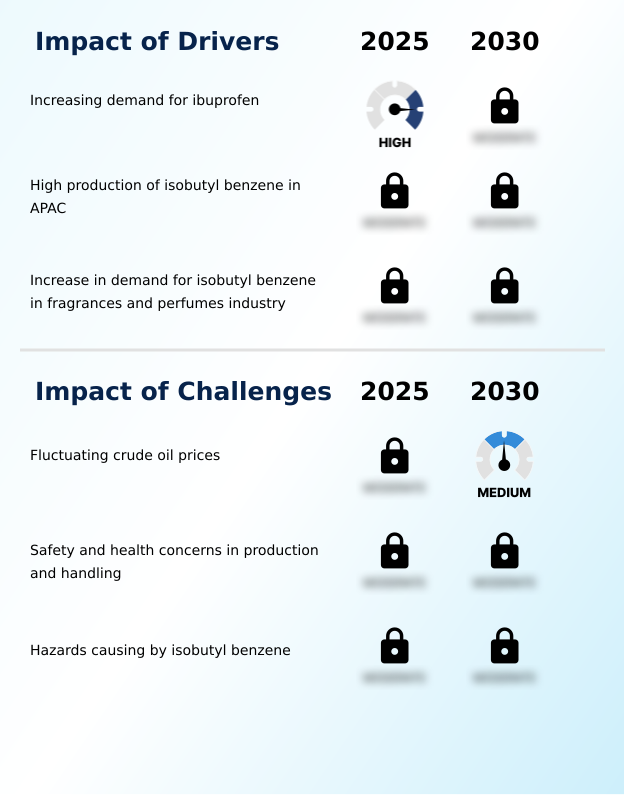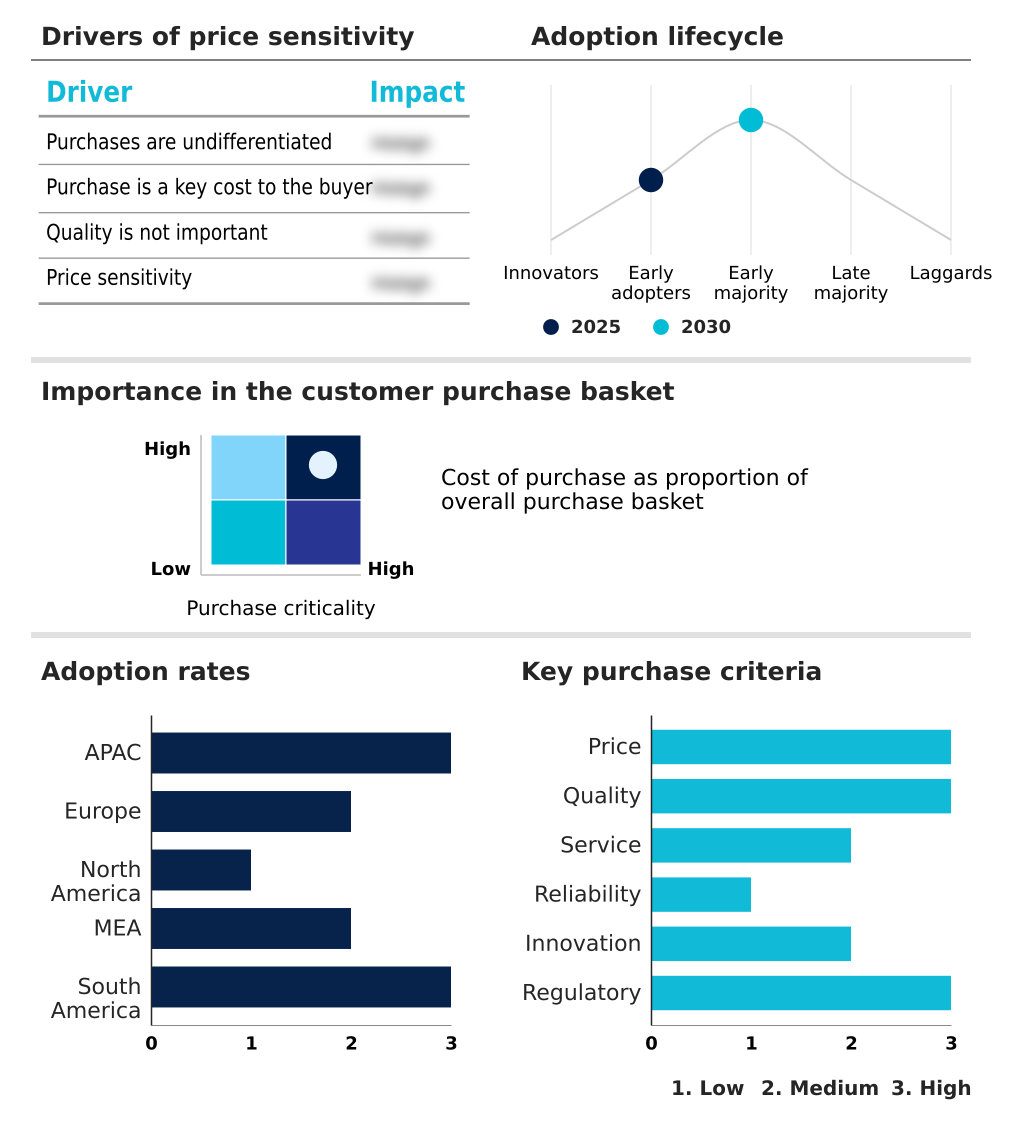Isobutyl Benzene Market Size 2026-2030
The isobutyl benzene market size is valued to increase by USD 22.87 million, at a CAGR of 5.6% from 2025 to 2030. Increasing demand for ibuprofen will drive the isobutyl benzene market.
Major Market Trends & Insights
- APAC dominated the market and accounted for a 46.2% growth during the forecast period.
- By Application - Coating segment was valued at USD 29.60 million in 2024
- By End-user - Pharmaceuticals segment accounted for the largest market revenue share in 2024
Market Size & Forecast
- Market Opportunities:
- Market Future Opportunities: USD 22.87 million
- CAGR from 2025 to 2030 : 5.6%
Market Summary
- The isobutyl benzene market is fundamentally tied to the production of essential medicines, serving as a foundational intermediate chemical. This colorless, volatile liquid is synthesized through the alkylation of benzene with isobutylene, a process critical for producing the precursor to ibuprofen, a globally utilized non-steroidal anti-inflammatory drug.
- Its primary application in pain management and anti-pyretic therapies anchors market demand, making supply chain stability a strategic priority for pharmaceutical manufacturers. Beyond medicine, it finds use in perfumery and surface coatings. A key trend is the backward integration by pharmaceutical firms to secure a stable supply of high-purity pharmaceutical-grade material.
- For instance, a drug manufacturer might invest in its own catalytic process facility to control the synthesis of 4-isobutylacetophenone, mitigating risks from feedstock cost volatility. However, the market faces challenges from fluctuating crude oil prices, which affect raw material costs, and stringent regulations governing the handling of this volatile organic compound.
- Growth is driven by the expanding global need for analgesics, particularly in emerging economies with rising healthcare access. This dynamic necessitates continuous innovation in production to enhance efficiency and meet strict purity standards.
What will be the Size of the Isobutyl Benzene Market during the forecast period?
Get Key Insights on Market Forecast (PDF) Request Free Sample
How is the Isobutyl Benzene Market Segmented?
The isobutyl benzene industry research report provides comprehensive data (region-wise segment analysis), with forecasts and estimates in "USD thousand" for the period 2026-2030, as well as historical data from 2020-2024 for the following segments.
- Application
- Coating
- Surfactant
- Medicine
- Others
- End-user
- Pharmaceuticals
- Chemical
- Textile industry
- Others
- Grade type
- Grade 1
- Grade 2
- Grade 3
- Geography
- APAC
- China
- Japan
- India
- Europe
- Germany
- UK
- France
- North America
- US
- Canada
- Mexico
- Middle East and Africa
- Saudi Arabia
- UAE
- South Africa
- South America
- Brazil
- Argentina
- Colombia
- Rest of World (ROW)
- APAC
By Application Insights
The coating segment is estimated to witness significant growth during the forecast period.
The coating segment leverages isobutyl benzene as a high-performance solvent and intermediate for industrial paints.
Its properties, derived from the reaction of benzene with isobutylene using acid catalysts, make it a valued coalescing agent in automotive and architectural applications, ensuring film uniformity and enhancing durability.
While it also serves as a precursor for some fragrance chemical synthesis, its primary non-pharmaceutical role is here.
The industry's push toward stricter environmental governance standards for volatile organic compound (VOC) emissions presents a challenge, demanding asset optimization and formulation innovation. Producers focus on operational resilience, balancing performance with compliance.
Optimized use in formulations has been shown to reduce coating defects by more than 10%, a critical factor for high-value finishes. This specialty chemical application remains vital where performance justifies its use.
The Coating segment was valued at USD 29.60 million in 2024 and showed a gradual increase during the forecast period.
Regional Analysis
APAC is estimated to contribute 46.2% to the growth of the global market during the forecast period.Technavio’s analysts have elaborately explained the regional trends and drivers that shape the market during the forecast period.
See How Isobutyl Benzene Market Demand is Rising in APAC Request Free Sample
The geographic landscape of the isobutyl benzene market is dominated by APAC, which accounts for over 46% of incremental growth and exhibits the fastest expansion rate.
This region, led by India and China, serves as the global manufacturing hub for high-purity isobutyl benzene, driven by cost advantages in petrochemical feedstock and a strong bulk drug production ecosystem.
In contrast, Europe faces de-industrialization risk due to high energy costs, though it remains a key consumer of pharmaceutical-grade material. North America is focused on reinforcing sovereign manufacturing capability and supply chain integrity to reduce import reliance.
Downstream integration is a common strategy across regions to control the organic synthesis value chain. The Middle East is leveraging its feedstock advantage to build out its specialty chemical capacity, representing a nascent but strategic growth area.
Market Dynamics
Our researchers analyzed the data with 2025 as the base year, along with the key drivers, trends, and challenges. A holistic analysis of drivers will help companies refine their marketing strategies to gain a competitive advantage.
- Strategic planning in the isobutyl benzene market requires a deep understanding of its diverse applications and operational complexities. The primary demand stems from its use in isobutyl benzene for pharmaceutical synthesis, especially as a precursor in the cost-effective ibuprofen synthesis route and its broader role in isobutyl benzene role in NSAID synthesis.
- The quality of high purity isobutyl benzene applications is paramount here. However, opportunities also exist in isobutyl benzene in fine chemical manufacturing, where it serves as an alkylbenzene sulfonate surfactant precursor or an industrial solvent properties of isobutyl benzene. Managing feedstock costs in production is a central challenge due to the volatility impact on isobutyl benzene price.
- This has spurred a focus on isobutyl benzene production process efficiency and exploring sustainable isobutyl benzene production methods. Companies are adopting backward integration in isobutyl benzene manufacturing to enhance supply chain resilience for chemical intermediates. Decisions often hinge on iso-butyl benzene purity grade comparison versus cost.
- Furthermore, regulatory standards for isobutyl benzene handling and concerns over the environmental impact of voc emissions are shaping operational protocols, making expertise in health and safety in chemical handling a competitive differentiator. Optimizing friedel-crafts acylation yield remains a key technical goal. The market's future hinges on balancing these demand drivers for analgesic precursors with manufacturing and compliance pressures.
- Firms in APAC, which represent over 46% of the market's incremental growth, are leading in balancing these factors.
What are the key market drivers leading to the rise in the adoption of Isobutyl Benzene Industry?
- The primary market driver is the consistently rising global demand for ibuprofen, for which isobutyl benzene is an essential precursor.
- Key market drivers include the rising demand for ibuprofen and the strategic consolidation of production in APAC. This region's dominance in bulk drug production offers cost advantages and ensures feedstock security.
- The synthesis process, involving friedel-crafts acylation to produce 4-isobutylacetophenone, is being optimized by regional players, some of whom have lowered production costs by 15%.
- Simultaneously, the growing fine chemicals industry is fueling demand for isobutyl benzene in personal care fragrances and household product additives. This diversification mitigates risks from feedstock cost volatility and strengthens supply chain resilience.
- Adherence to green chemistry principles is also becoming a driver, with sustainable production methods providing a competitive advantage. The dual demand from pharmaceuticals and consumer goods, with the latter growing at nearly 5% annually, provides structural momentum.
What are the market trends shaping the Isobutyl Benzene Industry?
- The increasing utilization of isobutyl benzene within the pharmaceutical industry stands out as a prominent market trend. This is driven by its critical role in producing essential medicines.
- A prominent trend is the expanding use of isobutyl benzene as a primary chemical building block in the pharmaceutical sector, particularly for ibuprofen API manufacturing. Its unique alkylbenzene structure makes it an indispensable specialty chemical for producing active pharmaceutical ingredients (APIs).
- The rising demand for analgesic medications and over-the-counter drug synthesis, driven by aging populations and self-medication practices, underpins this trend. Leading manufacturers are reporting efficiency gains of up to 12% through process enhancements aimed at this segment. Consequently, the production of generic medicines production and various pain management formulations relies heavily on a stable supply of these aromatic intermediates.
- This deep integration into the pharmaceutical value chain is solidifying the market's growth trajectory, with API-related consumption accounting for over 70% of total volume.
What challenges does the Isobutyl Benzene Industry face during its growth?
- The persistent fluctuation in crude oil prices presents a key challenge, directly impacting feedstock costs and market stability.
- The market faces significant challenges, primarily from feedstock price volatility and stringent safety regulations. As an aromatic hydrocarbon, isobutyl benzene production via alkylation of benzene is directly impacted by crude oil price swings, which can increase production costs by over 20% in volatile periods. Ensuring safety in handling this mono-alkyl benzene, a key ibuprofen synthesis intermediate, elevates operational expenses.
- Strict regulatory compliance standards for this non-steroidal anti-inflammatory drug precursor require significant investment in safety infrastructure, acting as a barrier to capacity expansion. This pressure is driving firms toward process optimization and sustainable sourcing to mitigate risks. However, achieving cost-effective compliance remains a hurdle, with safety-related expenses constituting up to 10% of operational budgets for some producers.
Exclusive Technavio Analysis on Customer Landscape
The isobutyl benzene market forecasting report includes the adoption lifecycle of the market, covering from the innovator’s stage to the laggard’s stage. It focuses on adoption rates in different regions based on penetration. Furthermore, the isobutyl benzene market report also includes key purchase criteria and drivers of price sensitivity to help companies evaluate and develop their market growth analysis strategies.
Customer Landscape of Isobutyl Benzene Industry
Competitive Landscape
Companies are implementing various strategies, such as strategic alliances, isobutyl benzene market forecast, partnerships, mergers and acquisitions, geographical expansion, and product/service launches, to enhance their presence in the industry.
Alfa Chemistry - Analysis indicates a focus on providing high-purity isobutyl benzene and related specialty chemical intermediates for pharmaceutical synthesis and industrial applications, emphasizing consistent quality and supply reliability.
The industry research and growth report includes detailed analyses of the competitive landscape of the market and information about key companies, including:
- Alfa Chemistry
- Alpha Chemika
- BASF SE
- Elchemy
- INEOS Group Holdings S.A.
- IOL Chemicals and Pharma Ltd.
- LGC Ltd.
- Loba Chemie Pvt. Ltd.
- Merck and Co. Inc.
- Otto Chemie Pvt. Ltd.
- Ralington Pharma LLP
- S D Fine Chem Ltd.
- Shandong Xinhua Pharma Ltd.
- SI Group Inc.
- Sinopec Shanghai Co. Ltd.
- Thermo Fisher Scientific Inc.
- Tokyo Chemical Co. Ltd.
- Vinati Organics Ltd.
- Vizag Chemical International
Qualitative and quantitative analysis of companies has been conducted to help clients understand the wider business environment as well as the strengths and weaknesses of key industry players. Data is qualitatively analyzed to categorize companies as pure play, category-focused, industry-focused, and diversified; it is quantitatively analyzed to categorize companies as dominant, leading, strong, tentative, and weak.
Recent Development and News in Isobutyl benzene market
- In September 2024, SI Group announced its intention to cease manufacturing operations at its production facility in Singapore to optimize its global footprint in response to changing market economics.
- In September 2025, Mangalore Refinery and Petrochemicals Limited (MRPL) announced it is setting up a 200 TPA pilot demo plant for isobutyl benzene using a patented in-house synthesis route.
- In April 2025, IOL Chemicals and Pharmaceuticals Limited received approval from China's Center for Drug Evaluation to export its ibuprofen API to the Chinese market, opening a significant new consumer base.
- In May 2025, Vinati Organics Ltd. reported that its isobutyl benzene volumes declined by approximately 27% in fiscal year 2025 compared to fiscal year 2024, signaling global demand-side challenges.
Dive into Technavio’s robust research methodology, blending expert interviews, extensive data synthesis, and validated models for unparalleled Isobutyl Benzene Market insights. See full methodology.
| Market Scope | |
|---|---|
| Page number | 299 |
| Base year | 2025 |
| Historic period | 2020-2024 |
| Forecast period | 2026-2030 |
| Growth momentum & CAGR | Accelerate at a CAGR of 5.6% |
| Market growth 2026-2030 | USD 22867.5 thousand |
| Market structure | Fragmented |
| YoY growth 2025-2026(%) | 5.1% |
| Key countries | China, Japan, India, South Korea, Australia, Indonesia, Germany, UK, France, Italy, The Netherlands, Spain, US, Canada, Mexico, Saudi Arabia, UAE, South Africa, Israel, Turkey, Brazil, Argentina and Colombia |
| Competitive landscape | Leading Companies, Market Positioning of Companies, Competitive Strategies, and Industry Risks |
Research Analyst Overview
- The isobutyl benzene market is defined by its critical role as an ibuprofen synthesis intermediate and a versatile chemical building block in organic synthesis. The core manufacturing route involves the alkylation of benzene with isobutylene using acid catalysts in a catalytic process known as friedel-crafts acylation, yielding 4-isobutylacetophenone.
- This mono-alkyl benzene serves as a key non-steroidal anti-inflammatory drug precursor, with demand for pharmaceutical-grade material driving production standards. Its alkylbenzene structure also makes it a valuable specialty chemical for producing aromatic intermediates and fragrance chemical compounds. Major producers are focusing on feedstock security for this vital petrochemical feedstock to ensure stable bulk drug production.
- A key strategic consideration is the shift towards green chemistry to manage the lifecycle of this aromatic hydrocarbon, which is classified as a volatile organic compound. Firms successfully integrating sustainable practices have reported a 15% improvement in resource efficiency. The market's health is inextricably linked to the supply chain for active pharmaceutical ingredients, where high-purity inputs are non-negotiable.
What are the Key Data Covered in this Isobutyl Benzene Market Research and Growth Report?
-
What is the expected growth of the Isobutyl Benzene Market between 2026 and 2030?
-
USD 22.87 million, at a CAGR of 5.6%
-
-
What segmentation does the market report cover?
-
The report is segmented by Application (Coating, Surfactant, Medicine, and Others), End-user (Pharmaceuticals, Chemical, Textile industry, and Others), Grade Type (Grade 1, Grade 2, and Grade 3) and Geography (APAC, Europe, North America, Middle East and Africa, South America)
-
-
Which regions are analyzed in the report?
-
APAC, Europe, North America, Middle East and Africa and South America
-
-
What are the key growth drivers and market challenges?
-
Increasing demand for ibuprofen, Fluctuating crude oil prices
-
-
Who are the major players in the Isobutyl Benzene Market?
-
Alfa Chemistry, Alpha Chemika, BASF SE, Elchemy, INEOS Group Holdings S.A., IOL Chemicals and Pharma Ltd., LGC Ltd., Loba Chemie Pvt. Ltd., Merck and Co. Inc., Otto Chemie Pvt. Ltd., Ralington Pharma LLP, S D Fine Chem Ltd., Shandong Xinhua Pharma Ltd., SI Group Inc., Sinopec Shanghai Co. Ltd., Thermo Fisher Scientific Inc., Tokyo Chemical Co. Ltd., Vinati Organics Ltd. and Vizag Chemical International
-
Market Research Insights
- The isobutyl benzene market is shaped by intense competitive dynamics and a focus on operational resilience. With high price sensitivity among buyers, producers face pressure to implement cost containment initiatives, as procurement is a key cost for downstream users. This is compounded by the high capex and labor required for production, making asset optimization critical.
- Strategies like backward integration and downstream integration are increasingly common, with some firms achieving a 15% reduction in supply chain costs. While de-industrialization risk looms in high-cost regions, the push for sovereign manufacturing capability in others creates new opportunities. Companies that master process optimization and secure supply chain integrity are better positioned.
- The market sees a 20% higher investment in facilities compliant with stringent environmental governance standards, reflecting a shift toward long-term sustainability.
We can help! Our analysts can customize this isobutyl benzene market research report to meet your requirements.
